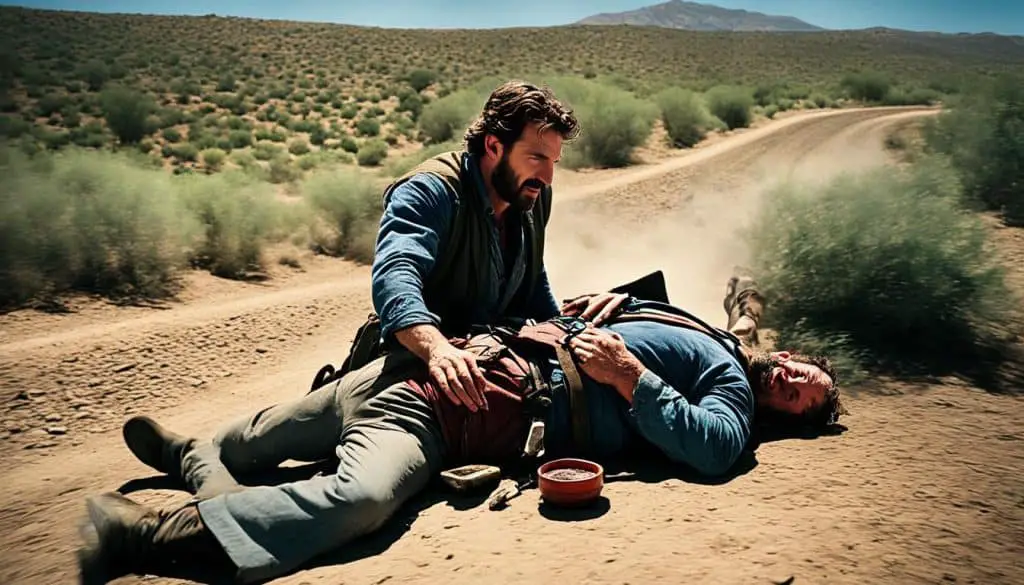Table of Contents
Have you ever thought about the lessons we can learn from landowners in the Bible? Their stories talk about faith, morals, and God’s plans. Let’s dive into the tales of 10 landowners and their experiences that share timeless lessons.
In the Bible, the landowners share insights into human life and the divine influence around us. Stories like Abraham’s trust in God or the Good Samaritan’s kindness challenge our views. They make us think deeply.
Let’s explore the stories of Abraham, Lot, Boaz, Naboth, the Rich Fool, the Wicked Tenants, the Good Samaritan, Job, and more. We’ll see how these landowners faced their challenges. They teach us lasting lessons.
Are you ready to find the deep wisdom in these old stories? Join us in this journey through 10 landowners’ powerful stories from the Bible.
Abraham – Faith in God’s Promised Land
In the Bible, the story of Abraham is a powerful tale of faith and following divine guidance. God tells Abraham to leave his homeland for a promised land. He promises to take care of him. Abraham, without doubt, follows God, stepping into the unknown.
His journey shows the importance of faith and obedience. Abraham leaves all that he knows, believing God will keep his word. His courage and trust make him a great model of faith.
“By faith Abraham, when called to go to a place he would later receive as his inheritance, obeyed and went, even though he did not know where he was going.” – Hebrews 11:8
In his trek to the promised land, Abraham faces famine and conflict. Yet he never doubts God’s promise. God blesses him richly, proving his faithfulness.
This story inspires us to trust in God’s provision even when we’re not sure of the path. Like Abraham, we can expect God’s blessings if we put our faith in Him.
| Key Lessons from Abraham’s Story |
|---|
| 1. Faith in God’s promises leads to blessings and abundance. |
| 2. Obedience to God’s commands demonstrates trust and reliance on His guidance. |
| 3. Stepping out in faith may require leaving behind familiarity and comfort. |
| 4. God’s provision is dependable, even in the face of challenges. |
Abraham’s journey teaches us vital lessons in faith, obedience, and trust in God. As we face our life’s journey, his story encourages us to trust in God’s promises. We can rely on God’s faithfulness like Abraham did.
https://www.youtube.com/watch?v=jbI8dLLNRgc
Lot – The Consequences of Choosing Fertile Land
Lot, Abraham’s nephew, faced a crucial choice. He had to choose the land that would affect his life. When he looked, he saw the fertile land near Sodom. It was rich and looked promising. This rich land caught Lot’s eye more than any other land. In Genesis 13:10-12, it says:
“And Lot lifted up his eyes and saw that the Jordan Valley was well watered everywhere like the garden of the Lord, like the land of Egypt, in the direction of Zoar. (This was before the Lord destroyed Sodom and Gomorrah.) So Lot chose for himself all the Jordan Valley, and Lot journeyed east. Thus they separated from each other. Abram settled in the land of Canaan, while Lot settled among the cities of the valley and moved his tent as far as Sodom.”
Choosing to live near Sodom brought big problems for Lot. Sodom was known for its wickedness, and it was eventually destroyed. By choosing this place, Lot and his family got pulled into its bad ways.
This story shows how important it is to think about the future effects of our choices. Even though the land near Sodom looked good, it wasn’t a wise choice morally. Lot was tempted by its wealth and forgot about the spiritual impact of his decision.
Lessons from Lot’s Story
- Think about the future: Lot’s mistake teaches us to think long-term. We should consider how our choices affect our own and others’ lives over time.
- Choose what’s right over what’s easy: Lot was drawn in by money and rich land. It teaches us the value of choosing what’s morally correct. This ensures a good and honorable life.
- Listen to advice: Seeking advice from wise people is crucial. They can help us see things clearly and make better choices.
We can learn a lot from Lot’s story and make better decisions in our own lives.

Boaz – Kindness and Blessings through Obedience
In the book of Ruth, Boaz stands out for his kindness and following God’s laws. He shows how being generous and living righteously brings blessings to everyone.
Boaz meets Ruth, a woman who has lost her husband, in his fields. Though not from his land, Boaz warmly welcomes Ruth. He lets her gather from his fields and keeps her safe.
This kindness comes from Boaz’s strong faith. In Ruth 2:12 (NIV), he tells Ruth, “‘May the Lord reward you for your faith. Under God’s wings, you are safe.’” Recognizing Ruth’s faith, he blesses her with food and safety, and she becomes part of Jesus’ family line.
Boaz’s Remarkable Act of Kindness
Boaz’s care for Ruth goes above just being kind. He tells his workers to help her more than expected. This shows his true concern for her well-being.
His actions teach us the lasting impact of showing love to those in need. He follows the law which tells us to care for widows and the less fortunate.
Ruth shares the amazing kindness she found in Boaz’s fields with Naomi. Naomi praises Boaz for his generosity in Ruth 2:20 (NIV). She understands it’s God’s favor and blessings working through Boaz.
The Blessings of Generosity and Righteous Living
Boaz’s choices dramatically change Ruth’s life and have deeper effects. His obedience and kindness are seen throughout generations, even leading to King David.
This story shows us how living righteously creates good for many. It highlights the importance of showing kindness to all. By living like Boaz, we can make a real difference around us.
| Blessings of Boaz’s Kindness and Obedience |
|---|
| Physical and emotional provision for Ruth |
| Preservation of Naomi’s lineage |
| Fulfillment of God’s promise to Abraham |
Naboth – Standing Up for What’s Right
In 1 Kings 21, Naboth’s courage against King Ahab’s wish stands out. Despite the king wanting his vineyard, Naboth refused. This shows immense bravery.
Naboth’s firm stand against wrong proves his honesty. His story highlights the importance of holding true to your beliefs, even in tough times.
“The vineyard of Naboth the Jezreelite, which is in Jezreel, is next to the palace of Ahab king of Samaria. Let me give you a better vineyard in its place, or if you prefer, I will pay you its worth in silver.” – 1 Kings 21:2
Naboth loved his vineyard very much. Its value was not in money but in its memories. He refused to sell, showing us the worth of our beliefs.
Naboth’s Resolute Stand
Even though King Ahab tried hard, Naboth didn’t give in. His strong stance teaches us about the true power of being ethical. It speaks to us about fighting against wrong.
A Message of Justice and Integrity
Naboth’s tale is a guide on standing up for morality and fairness. It tells how important it is to do the right thing, no matter what. His story inspires us to face evil with courage.
| Lessons from Naboth’s Story |
|---|
| 1. Upholding ethical values and principles |
| 2. Resisting the temptation of material gain |
| 3. Standing against injustice and oppression |
| 4. Maintaining personal integrity despite external pressure |
“The Lord forbid that I should give you the inheritance of my ancestors.” – 1 Kings 21:3
Naboth’s refusal to bow is a model of bravery. His stance shows us how fighting for what is right matters. It reminds us that even one person can bring change when they fight for justice.

The Rich Fool – Neglecting Spiritual Well-Being for Material Wealth
In Luke 12:16-21, we find the parable of the Rich Fool. It warns us about choosing money over spiritual well-being. A rich man focused only on his wealth. He ignored life’s uncertainties and the need to connect with God.
“The land of a rich man was very productive. He thought to himself, ‘What shall I do, since I have no place to store my crops?’ He decided, ‘I will tear down my barns and build bigger ones. Then I will have plenty of grain and goods stored up. I can say to myself, “You have plenty of goods saved for many years. Take life easy. Eat, drink, and enjoy yourself.”‘
“But God told him, ‘You’re a fool! Tonight you will die. Then who will get everything you’ve saved?’
“This is how it is for anyone who saves only for themselves but is not rich toward God.”
This parable asks us to check our own lives. Are we too focused on money instead of spiritual growth and well-being?
The Dangers of Wealth Accumulation
Today, getting rich and successful is very important to many. The Rich Fool’s story shows that wanting money is not bad. But it’s risky when it’s the only thing we care about.
When we prioritize wealth, we might overlook what’s most important – our relationships and spiritual health. We end up always wanting more but never being truly happy.
A Reminder to Prioritize Spiritual Well-Being
Like the Rich Fool, we should think about our own life and what’s truly important. This parable focuses on our spiritual health and relationship with God.
True fulfillment and happiness come from connecting with something bigger than us. Even as we meet our material needs, we must not forget our spiritual well-being. This balance takes effort and self-reflection.

Seeking True Riches
True wealth isn’t just about money. It’s about our relationships, how we help others, and our growth in faith. Money only gives temporary comfort.
Christ reminds us not to love earthly treasures. Rather, we should focus on heavenly riches, where things don’t break or get stolen (Matthew 6:19-20).
The tale of the Rich Fool encourages us to value spiritual well-being over money. It invites us to seek real wealth in a life filled with purpose, loving relationships, and God’s presence.
The Wicked Tenants – Rejecting Prophets and Consequences
The story of the Wicked Tenants teaches us a lesson. It warns about bad things happening when we don’t listen to those bringing god’s messages. In Matthew 21:33-41, we learn why it’s important to respect and follow what is right.
Jesus tells a story about a vineyard owner. He rented the vineyard and asked for his share of the produce. But the tenants were cruel to his workers, even killing some. When the owner sent his son, they killed him too. This was because they wanted the vineyard for themselves.
“What do you think the owner will do to these tenants?” Jesus asked. The crowd answered, “He will punish those evil people and give the vineyard to others.” (Matthew 21:40-41)
This story warns of Jesus being rejected by many people. It talks about His sacrifice on the cross. It shows us that rejecting god’s teachings has serious consequences.
Jesus uses this story to say what’s right. He shows how bad things can get when we turn away from God. The tenants who didn’t listen to the owner remind us to pay attention to God’s guidance.
This story makes us think about how we act towards God’s messengers. It asks if we truly listen to what they say. It teaches us to be humble and follow God’s wisdom completely.
Key Lessons from the Parable of the Wicked Tenants:
- 1. Respect and honor the messengers of God
- 2. Embrace divine teachings with an open heart
- 3. Beware of the consequences of rejecting righteousness
- 4. Surrender to God’s authority and wisdom
- 5. Strive to cultivate a heart of humility and obedience

| Keywords | Related Concepts |
|---|---|
| Wicked Tenants | Mistreatment, Rejection, Rebellion |
| Prophets | Divine messengers, God’s chosen representatives |
| Matthew 21:33-41 | Parable of the Wicked Tenants, Consequences of rejection |
The Good Samaritan – Challenging Assumptions of Righteousness
The Good Samaritan story changes how we see who is truly good. A Samaritan helps a person in need, teaching us about love, acceptance and caring for everyone.
In this story, a man was badly hurt and left alone. A priest and a Levite saw him but did nothing to help. Then, a Samaritan, usually looked down on, stops to help the injured man. He breaks the norm, showing us that kindness is what truly matters, not labels or status.
The Samaritan landowner cares for a stranger, showing true righteous behavior. This teaches us that kindness is universal. It should be shared with everyone, no matter where they come from.
The Good Samaritan story makes us rethink who we should help. It tells us being right isn’t about our religion or who we are. True goodness comes from caring for others and acting with love.
“But a certain Samaritan, as he journeyed, came where he was. And when he saw him, he had compassion on him.” – Luke 10:33
The Good Samaritan story makes us think about how we treat others. We should follow his example. No matter our differences, we should help and be kind to everyone.
Key Takeaways:
- The story of the Good Samaritan challenges assumptions of righteousness based on religious identity or social status.
- The Samaritan landowner exemplifies acceptance, compassion, and helping those in need, defying societal stereotypes.
- True righteousness is rooted in empathy, kindness, and a willingness to help others, regardless of perceived differences.

Job – Suffering and Faithful Endurance
Job was a faithful man who owned a lot of land. But his life took a turn for the worst. In the book of Job, we see his incredible strength through the hardest times. His story helps us understand suffering and how staying faithful really matters.
At first, Job had it all. He was rich with land and things. But then, he lost everything – his wealth, his family, and his health. He was deeply upset and started to question his faith in God. Still, he kept believing, showing us that faith during tough times matters a lot.
Suffering is part of life, even if we are very faithful. Job faced many tough questions, like why bad things happen to good people. But he held onto his belief, proving that trust and sticking to your faith is powerful. His story inspires us to keep going through hard times, showing that it leads to something better and a stronger faith.




